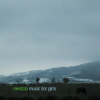Minizza, "Music for Girls"
 Edward Ka-Spel's appearance on the upbeat and bubbling "Globally Yours" is the cream of the crop as far as this record is concerned. I avoided listening to this record for longest time after reading the puerile lyrics for "Monoball," but after giving it a chance it's now obvious that this release needs memorable tunes more than anything else.
Edward Ka-Spel's appearance on the upbeat and bubbling "Globally Yours" is the cream of the crop as far as this record is concerned. I avoided listening to this record for longest time after reading the puerile lyrics for "Monoball," but after giving it a chance it's now obvious that this release needs memorable tunes more than anything else.Brocoli
It isn't shocking that a French duo would write a song in the English language and have it fail miserably. The music itself isn't particularly vapid in this case, but when reading lyrics that come across like a teenage nightmare, it's difficult to get caught up in a mood or feeling the music might be trying to convey. I think I might want to dance to this song, but knowing that the lyrics have something to do with having just one ball is... disappointing. The whole song ends up feeling cheap; it would've sounded better without the robotic lyrics, anyways. Yet listening to the opening "Y A-t-il de L'eau Sur Mars?" I get a completely different sense of who this band is and what they do. The quietly pulsing, delicate arrangement of electronic carbonation on this song is exciting, a quick buzz of catchy rhythms and unusual collage. But it's an outright lie because nothing else on Music for Girls sounds anything like it. Only "En Forêt" comes close to reproducing the anxiety of the melodies and rhythms on the opening track. Unsurprisingly, both songs are listed as being based on samples from songs by other people. Minizza work very well when they're given an already interesting set of sounds to work with, but when it comes to doing their own thing, they fail most of the time.
Ka-Spel's presence on "Globally Yours" is enticing, his voice well suited for the rolling percussion and synthetic melodies that litter the song in stabs and gasps. Peter Hook's bass must've been stolen and used for the recording of this song, however, because it's oh so obvious that his particularly stoic manner of playing laid the groundwork for the track's central melody. The rest of the album is an amalgam of styles and French vocal performance, none of which are especially attractive nor catchy. Despite the use of saxophones, flutes, and strings, none of the songs on Music for Girls is exotic or unique. In an attempt to cover a lot of ground stylistically, the band failed to write anything more than two songs worth of melodies worth keeping in the old memory banks. Even the silly and somehow sexually disturbing "Monoball" outclasses most of the second half of the record.
Add the fact that many of these songs don't sound like they even belong on the same album and the end result is a disappointing record that began with a lot of promise. Trying to smash all these massively different songs together on the same album makes much of the music seem lame and forced. The lazy and sensual "Je Suis Mort" is a pretty song, but it sounds like it belongs to the romantic world of France as envisioned by tourists from America during the 60s, not to the shape and sound of the rest of the record. Since none of the songs really sound like they belong together, this sense of discontinuity keeps the record from ever really grabbing hold of me. The exceptions are the three more abstract songs the occupy the beginning and end of the record. The final song on the album, "Juste Avant l'Orage," sounds like a cramped and drug fueled vision of all the most possessive and aggravated aspects of every relationship ever suffocated out of existence by paranoia and violence. As such, it's an impressive and maniacal song that doesn't belong anywhere on an album otherwise filled with failed pop songs and sickeningly sweet imitations of French music from twenty or so years ago.
samples:



